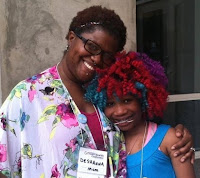Labor Day is a time to remember the value of work and the best tool in labor’s toolbox: Solidarity. Fair wages, dignity on the job, security for our families—and these days—even democracy itself depend on that Hammer of Solidarity. But Solidarity has been taking a beating from all sides recently, deformed by fear and distrust. The head’s been dislodged by callout culture and the handle gouged by resentment. Mostly these harms come from outside, sometimes by those with good intentions, but often by those determined to destroy us. When we parrot their calls, however, it is we who harm ourselves.
Callout culture relies largely on commercial and social media to convert real or perceived grievances into a cancellation campaign. There’s no due process, no proportionate penalty, and no quality of mercy in this form of justice. While some say it impowers the powerless, it is, in fact, a dis-empowering distraction, focusing on individuals rather than systems, substituting divisive cheap shots for the enormous efforts required to organize the working class. Think about the arduous campaign of a previous generation of radicals to spread industrial unionism throughout the auto, steel, and mining industries in the first half of the last century.
“Divide and rule” has always been the way conquerors and corporations protect power and profits. Hence, corporate media is happy to promote this sort of divisive “empowerment.”
Fortunately, there is push back against such a detour from real organizing. For example, the veteran African American feminist Lorretta Ross has promoted “calling in,” “a callout” she explains, “done with love and respect.”
The powerful who abuse their station and influence should still be called out, but callout culture often targets those with no real power and relies on the exploiter to enforce its cancel campaigns.
Recently, liberal media has begun to pay attention to Lorretta Ross’s message, but they minimize the progressive nature of her arguments. They neglect to mention what she says about the far more significant cancellation of progressive and labor voices and the way cancel culture is exaggerated by the corporate far right to promote resentment.
How many activists and union leaders do you see interviewed on Public Television? How many thousands of workers are fired illegally—canceled—every year for union activity? How many non-union “at will” employees are terminated for somehow offending the boss? Don’t expect to see it on the Six O‘Clock News, much less Fox News.
Now, I worked for three decades at Chrysler’s Newark Assembly Plant (NAP) in Delaware and was a member (and sometimes officer) in UAW Local 1183. In our plant we had men, women, whites, browns, Italians, Blacks, gays, trans, Christians, Muslims, guys who wore the Stars and Bars on their backs, and left-wingers like me. Not that there were not tensions sometimes, but by and large we worked peacefully side-by-side on the assembly line, partied together at social functions, and swung that hammer of solidarity together on the picket line. The callout crowd would have been outraged by how one African American trans sister was known affectionately as “Sweet Thang,” and one of the few Jews in the plant was nick-named “A-rab.” A woman we dubbed Sarge would have reacted to sexual harassment with a knuckle sandwich, not a tweet. That’s not to say that we should not have been more sensitive, and we were in more formal situations, but shop talk around machines that could rip your head off tended to be as brutal as that welding gun pelting your skin with white-hot slag.
Those tensions that we expressed insensitively at times are now weaponized by the most dangerous, undemocratic, and anti-union forces in American history.
In the name of Solidarity, we need to think twice before taking their poisoned bait.
Just as Loretta Ross warns us not to call out those on our same class level, we should be wise to those in the far-right media who call out our class siblings for perceived advantages.
Take the reduction in student debt just accomplished. The far right claims this is a favor to the bourgeois elite. If that were true, I would resent it, too, just as I resent the $987,237 in Paycheck Protection Program (PPP) loans forgiven for Pennsylvania Republican Rep. Mike Kelly, who tweeted regarding the student loans, “Asking plumbers and carpenters to pay off the loans of Wall Street advisors and lawyers isn’t just unfair. It’s also bad policy.”
Does he hear himself?
Sorry, Mike, plumbers and carpenters take out student loans, too, along with freight haulers, medical technicians, home care workers, and physical therapists. As Jim Tankersley notes, “the people eligible for debt relief are disproportionately young and Black. And they are concentrated in the middle band of Americans by income, defined as households earning between $51,000 and $82,000 a year.” The cost of the program is offset by Medicare savings in reduced drug prices, while PPP (only a quarter of which actually supported jobs that would otherwise have disappeared) came out of the taxpayer’s pockets and was rife with fraud. Note that since Ronald Reagan, government support for social goods like college education has plummeted, exploding the cost of enrollment—eighteen times at the University of Delaware since the early 60s, when I first attended.
And it is social goods that the fake pro-worker ultra-right politicians are after, such as social security, collective bargaining, and—spoiler alert—taxing the billionaire class.
Now, both liberals and their ultra-right adversaries are responsible for caving in to (Libs) or coddling (Repubs) capitalists in the de-industrialization of America and shipping our jobs overseas. Recent climate legislation, however, is reversing this trend, in tech production and infrastructure, not just brain work. The ultra-right fought this legislation, as well as every other bill proposed by the current administration and meant to help the American people, and they lie about climate change in the face of thousand-year-record droughts and floods.
It is the working class, of course, that drives progressive change in America, not capitalists or their politician enablers. Union drives are sweeping the nation, from Starbucks to Amazon to the unionized auto industry, re-energized by the drive to sweep out the corrupt leaders who negotiated the two-tier wage structure. Talk about a means for the suits to stoke resentment!
On the wall of our old union hall, there used to be a painting, Arsenal of Democracy, representing the role of industrial labor in fighting European fascism and defending American democracy. Now we have “semi-fascists” at the gates, baiting the working class with the poison of resentment, covert and overt racism, and lies.
Don’t spread the bait. When social media memes get you steaming with resentment, consider who that resentment serves and what class sibling it scapegoats. Safeguarding Solidarity safeguards our heritage and honor. This Labor Day, let us cherish our Hammer of Solidarity: “It’s the hammer justice / It’s the bell of freedom / It’s the song about love between / Our brothers and our sisters / All over this land.” (“If I Had a Hammer,” Lee Hays and Pete Seeger)









